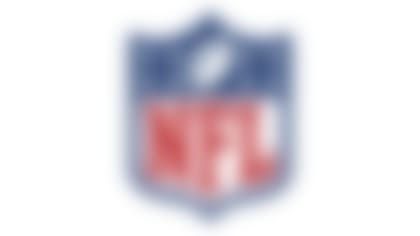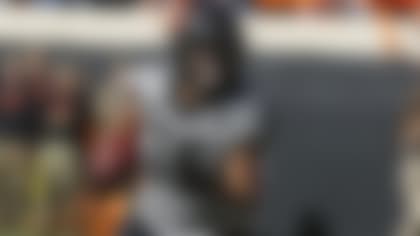Amidst a wave of recent complaints from coaches and players about officiating, the head of the NFL Referees Association says officials have continued to grade out with a high percentage of correct calls while adapting on the fly to an evolving emphasis on roughing the passer rules.
"There will be issues with officiating. There always are," NFLRA executive director Scott Green told me by phone Wednesday night. "The issue from our standpoint is: We call what we're told to call. It's how well is that being interpreted? And how well is that being presented to us? To the extent that they're trying to get video out, when you start making changes in the season -- obviously, I'm not saying that shouldn't be done, but it does require adjustment and it seems like we're doing some adjusting this year.
"It's all about consistency. Everybody wants consistency. We want to be consistent. Coaches want it. Players. It makes for a better game. If adjustments are going to be made, we'll try to catch up and make sure we're making the adjustments as everyone sees fit."
On Wednesday, the NFL fined Pittsburgh Steelers coach Mike Tomlin $25,000 for criticizing game officials after last weekend's 41-17 win over the Atlanta Falcons -- comments in which Tomlin, a Competition Committee member, said some calls are "a joke," penalties are costing people games and jobs and he's "pissed about it." Elsewhere, New York Giants cornerback Janoris Jenkins said "we need better referees" and the likes of Baltimore Ravens quarterback Joe Flacco and Seattle Seahawks coach Pete Carroll took issue publicly with critical calls in their respective losses.
Though fines for complaining about officiating are relatively rare, the NFL Game Operations Manual says public criticism "has long been unacceptable in any forum ... because it calls into question the integrity of, and public confidence in, our game." Green -- who spent 23 seasons as an NFL back judge, field judge and referee before retiring after the 2013 campaign -- said the bigger concern for the union is criticism of individual officials and physical and verbal abuse of officials on the field. (The NFLRA sent a letter to Commissioner Roger Goodell last year after multiple instances of players shoving officials.)
Asked about Tomlin's fine, Green said: "Are we glad to see the league take a response like that? Yeah. But we're not saying, 'Hey, we never make a mistake.' We make mistakes. (If) you want to point out our mistakes, that's understandable."
While roughing the passer penalty numbers are up (50 through Week 5, compared to 29 at this time in 2017), overall penalty numbers are in line with historical standards -- and actually down from a year ago (16.55 per game, compared to 17.05 in 2017).
The NFLRA website touts the accuracy of officials, saying an official who works 14 regular-season games is evaluated on nearly 2,200 snaps, and in 2014, they got it right 95.9 percent of the time. (The NFL does not release grades publicly, though its football operations website says officials "are typically accurate on 95 to 97 percent of calls.") Officials are graded on a weekly basis, receive a midseason report and are evaluated for potential postseason assignments, including the Super Bowl, based on their performance over the season.
Some high-profile mistakes by officials this season have simply been blown calls, such as Oakland Raiders quarterback Derek Carr's fumble against the Cleveland Browns that was inexplicably ruled "in the grasp." There also have been some controversial replay review decisions, but those now are made from NFL headquarters in New York, not by officials on the field. A new rule on lowering the helmet generated a lot of preseason flags (and complaints) before the NFL Competition Committee clarified the rule in late August.
But the most heated issue this season has been roughing the passer penalties -- including two called against Tomlin's Steelers on Sunday -- as the league emphasizes protection on quarterbacks. (Is it working? Well, the only Week 1 starting QBs to miss a game solely because of injury this season are Tennessee's Marcus Mariota and San Francisco's Jimmy Garoppolo, who tore his ACL on a non-contact play.) The Competition Committee met via conference call after Week 3 to discuss enforcement of roughing the passing rules with a specific emphasis on the use of body weight, and while it determined there would be no change to the point of emphasis or the rule, it clarified techniques that constitute a foul to ensure consistency in officiating.
"You go with what you've been trained, and what you don't want to be doing is sitting there saying, 'Now, wait a second, this kind of looks like what I saw yesterday in the video.' It's happening really, really quick," Green said. "Optimum is you get all that worked out in the spring. The only way from an officiating standpoint, at least in football, that you get better is ... you've got to do the reps. You've got to be on the field. You've got to see things happen. And roughing the passer, you're not going to see in OTAs and you're not going to see a whole lot in training camps."
The hope now, Green said, is there are no major changes the rest of the season, so officials, like teams, can peak down the stretch. Though, as the stakes rise, Green wouldn't be surprised if complaints rise, too.
"The state of officiating is pretty good, actually," Green said. "It seems officiating has kept up with the pace of the game, has kept up with the new rules, and frankly, as long as our guys know what the league wants called and the Competition Committee can make that clear and the message can be made clear, then that's what we're going to call."
Follow Tom Pelissero on Twitter @TomPelissero.












